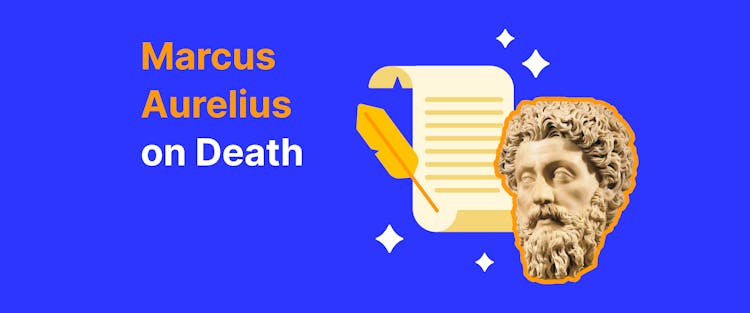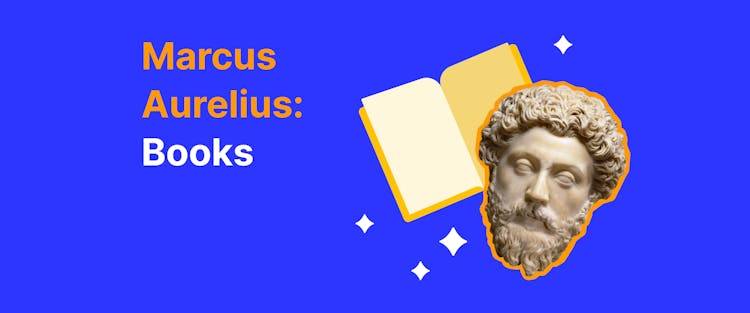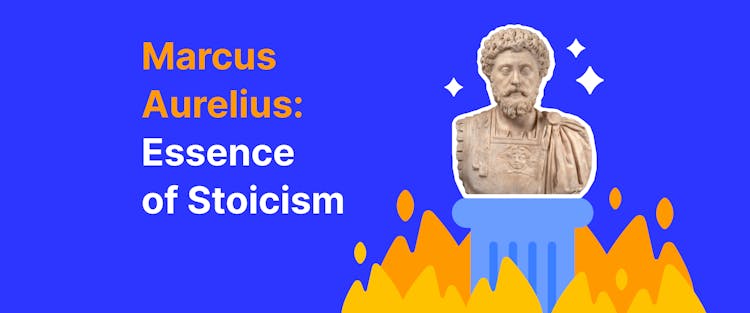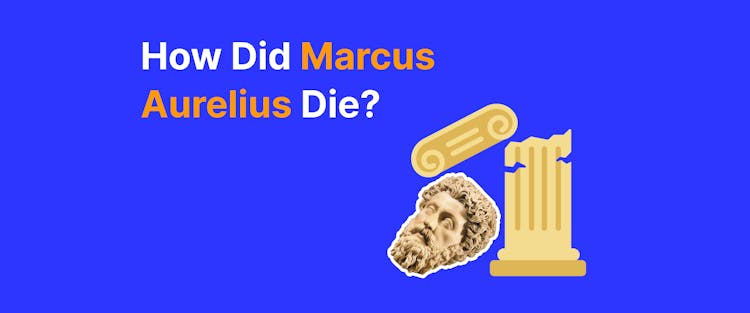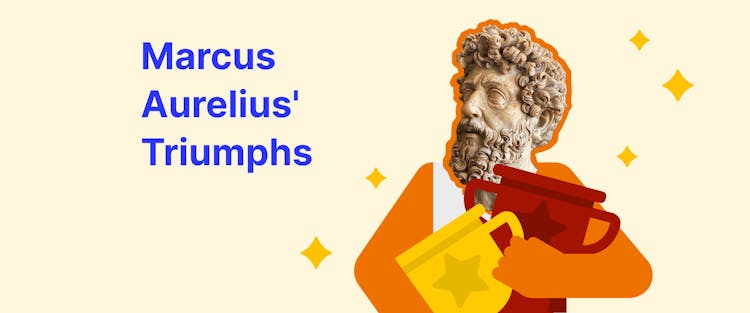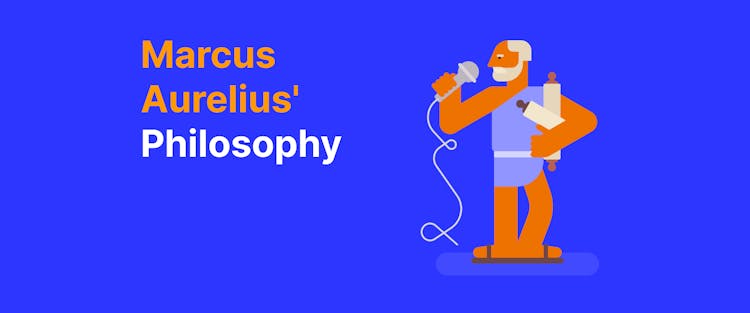Marcus Aurelius Antoninus Augustus, one of the most influential figures in ancient Rome, left a lasting legacy as a wise ruler and a profound philosopher. He belonged to the group known as the Five Good Emperors, which included Nerva, Trajan, Hadrian, Antoninus Pius, and Marcus Aurelius. Marcus Aurelius rose to become Emperor of Rome in the second century and remains celebrated for his Stoic philosophy, highlighted in his writings called "Meditations."
Early life and coming into power
Marcus Annius Verus (later Marcus Aurelius) was born in Rome on April 26, 121 AD, during Emperor Hadrian's reign. His family had a distinguished lineage connected to several prominent figures in Roman politics and society. From an early age, Marcus was raised for leadership, receiving a comprehensive education in rhetoric, literature, and philosophy.
However, when he was only three years old, Marcus faced the untimely death of his father. This loss started a period of uncertainty, yet it also instilled in him a sense of responsibility and resilience that would shape his character in the coming years.
Raised by his grandfather and later by his uncle, Marcus was exposed to the intricacies of Roman politics and governance from a young age.
It was during his early years that this Roman emperor encountered the teachings of Stoicism, a philosophy that would profoundly influence his worldview and guide his actions throughout his life. Taught by Stoic philosophers like Junius Rusticus and Apollonius of Chalcedon, Marcus gained an understanding of Stoic ethics, learning to cultivate inner strength, virtue, and self-control in the face of life's adversities.

Adoption by the heir to the throne
Marcus's path to power took a decisive turn in 138 AD when an heir to the throne, Antonius Pius, adopted Marcus Aurelius. However, it would be over two decades before Marcus would ascend to the throne, a period marked by the reigns of Hadrian and his adoptive father, Antoninus Pius.
Marcus received his education at home, a practice common among aristocrats of his time. He studied Latin and Greek (taught by Herodes Atticus), rhetoric, and philosophy.
In "Meditations" Marcus expresses gratitude to the gods for the influence of three Stoic teachers: Apollonius, Rusticus, and Maximus, whom scholars generally consider his most prominent mentors. Additionally, Marcus studied Platonism with Alexander of Seleucia and Aristotelianism under Claudius Severus. Although there is no explicit mention of a specific Epicurean instructor, Marcus seems to have been acquainted with Epicurean literature.
Wife and children
Faustina the Younger, daughter of Emperor Antoninus Pius, became Marcus Aurelius's wife in 145 AD. Their union was not merely political but marked by genuine affection and partnership, though not without their share of marital drama. Despite the challenges and demands of imperial responsibilities, Marcus Aurelius and Faustina shared a close bond, evident in their correspondence and mutual support. Faustina accompanied Marcus Aurelius on military campaigns, symbolizing her significant role in both his private life and public affairs.
The couple had a total of 13 children, though not all survived infancy. Among their notable descendants were Commodus, who would succeed Marcus Aurelius as emperor, and Annia Cornificia Faustina, remembered for her intelligence and influence.
The family dynamic reflected the complexities of Roman aristocracy, with marriages often serving strategic alliances and children groomed for political prominence. Despite the demands of his reign, Marcus Aurelius prioritized his family, seeking to instill in his children the values of virtue, wisdom, and humility amidst the backdrop of imperial power and ambition.
Becoming an emperor
In 161 AD, Marcus Aurelius and his adoptive brother assumed the title of Emperor following the death of Antoninus Pius. Marcus embraced his role with a sense of duty and determination, becoming one of Roman history's most respected and admired emperors. As he later said:
"Waste no more time arguing about what a good man should be. Be one."

His rise to power marked the beginning of a new chapter for the Roman Empire, one characterized by wisdom, virtue, and the unwavering pursuit of the common good.
In the chaos of Roman politics and imperial power struggles, Marcus Aurelius stood out as a symbol of Stoic wisdom and moral leadership. His early life experiences, shaped by personal tragedy and philosophical inquiry, laid the foundation for a reign marked by integrity, compassion, and the relentless pursuit of excellence. As Marcus would later reflect in his seminal work, "The Meditations of Marcus Aurelius," true greatness isn't about chasing power or fame but about developing wisdom and virtue.
Philosophical сontributions
Every aspect of Marcus Aurelius' life was guided by Stoicism. In "Meditations," he thanks his Stoic teacher, Rusticus, for introducing him to Epictetus. In a letter to Fronto, he mentions reading the Greek Stoic Aristo of Chios and feeling inspired by his teachings. Marcus Aurelius' "Meditations" reflects his Stoic beliefs, emphasizing acceptance, inner peace, and virtue in tough times.
Three central themes of Marcus Aurelius' Stoic philosophy
"Virtue as the sole good."
One of the central themes of Marcus Aurelius' Stoic philosophy is the concept of "virtue as the sole good." For Marcus, real happiness and fulfillment come from moral goodness and inner peace, not from wealth or possessions. In "Meditations," preserved for us by people like Arethas of Caesarea, we read that "The happiness of your life depends upon the quality of your thoughts," urging readers to focus their attention on cultivating virtues such as wisdom, courage, justice, and self-discipline. In an age focused on materialism and chasing success, Marcus's lessons remind us to value inner richness and moral honesty."Living in accordance with nature."
Another key theme of Marcus Aurelius' Stoic philosophy is the practice of "living in accordance with nature." For this philosopher king, this means accepting the fundamental principles of the universe, including the inevitability of change and the impermanence of all things. In "Meditations," he urges us to embrace the present moment and to surrender our attachment to external outcomes, recognizing that true freedom lies in accepting things as they are rather than as we wish them to be. This approach provides guidance for discovering peace and calmness in the midst of life's trials.Mental mastery and resilience.
Perhaps the longest-lasting lesson of Marcus Aurelius' Stoic philosophy is his emphasis on the power of the human mind to shape our experience of reality. In "Meditations," he writes, "You have power over your mind - not outside events. Realize this, and you will find strength." This emphasis on the importance of cultivating mental resilience and emotional equanimity resonates deeply in an age marked by anxiety, stress, and uncertainty. By learning to control our thoughts and attitudes, Marcus teaches us, we can find peace and tranquility even in the midst of chaos and turmoil.

Marcus Aurelius' Stoic philosophy, together with Seneca, Cicero, Zeno, and Epictetus, offers timeless wisdom and practical guidance for navigating the challenges of modern life. By nurturing virtues such as wisdom, courage, and self-discipline, by living in accordance with nature, and by using the power of our minds to shape our experience of reality, we can find true happiness and fulfillment in an ever-changing world. As Marcus Aurelius said: "Waste no more time arguing about what a good man should be. Be one."
Reign and achievements
Over the course of his reign, Marcus implemented a series of administrative policies, led military campaigns, and made significant contributions that shaped the Roman Empire for generations to come.
Strategic leadership and governance
At the start of his reign, Marcus faced the difficult task of managing a vast and diverse empire stretched across three continents. Even in the face of challenges, he proved to be a skillful military leader, ensuring the security of Rome's borders and the empire's stability. He focused on efficiently governing the empire, collaborating with the Senate, and enacting legal changes to uphold justice and improve society's well-being.
Commitment to justice and public welfare
Rather than indulging in personal luxuries or pet projects, as seen with Nero and Domitian, the focus remained steadfastly on the welfare of the Roman people. Resources were directed toward fostering business growth, developing essential infrastructure, and establishing a modest social safety net. During Marcus Aurelius's reign, a daily provision of bread, pork, and oil was ensured for the people. This approach significantly bolstered Marcus Aurelius' popularity and contributed to the empire’s stability.
Marcus devoted most of his time to legal affairs, diligently attending to matters such as petitions and resolving disputes. Unlike many who came before him, Marcus was well-versed in imperial administration even before assuming the throne, demonstrating a remarkable proficiency in both theory and practice of legislation. Esteemed by professional jurists as "an emperor most skilled in the law," Marcus earned praise as "a most prudent and conscientiously just emperor."
Military campaigns
Battling on two fronts: The Parthian and Marcomannic wars.
Military campaigns played a crucial role during Marcus Aurelius' reign as he struggled with a series of external threats and internal plagues. Throughout Marcus's rule, the Roman Empire faced several military challenges, like the Parthian War and Marchomanic Wars, with invasions threatening its major borders. Despite successful battles against the Parthians from 162 to 166, troops returning to Rome brought a deadly plague. Subsequently, there were the Marcomannic Wars (166-180 AD), a long battle against Germanic tribes along the Danube border. Although the Romans managed to repel the Germans, Marcus's co-emperor, Lucius Verus, passed away during the campaign in 169.Internal threats and usurpation attempts.
In 175, Avidius Cassius declared himself emperor after hearing that Marcus Aurelius was on the verge of death, prompted by news from Faustina the Younger. Despite controlling key provinces in his homeland of Syria, including Egypt, Syria, Syria Palaestina, and Arabia Petraea Cassius was ultimately slain by a centurion from his own ranks before facing Aurelius in battle.Consolidation of power and religious policy.
Later, in 177, Marcus appointed his son Lucius Ceionius Commodus as co-emperor. Despite being known for his gentle demeanor and vast knowledge, Marcus held a strong stance against Christianity, supporting the persecution of its followers. Facing strong enemies and logistical challenges, Marcus showed strategic skill and military strength, leading his legions to victories securing the empire's northern borders and protecting its lands.

Culture and philosophy
In addition to his military campaigns, Roman Emperor Marcus Aurelius made significant contributions to the cultural and intellectual life of the Roman Empire. He supported the work of scholars, philosophers, and artists, creating an environment of intellectual curiosity and artistic creativity. Marcus's philosophical writings, especially his "Meditations," remain inspiring for their timeless wisdom and understanding of humanity.
However, Marcus Aurelius' greatest legacy to the Roman Empire was his embodiment of Stoic virtues in both personal and political spheres. He upheld the Stoic way of life based on principles like moderation, humility, and moral integrity throughout his rule, even amidst challenges like the Antonine Plague. His leadership during crises earned him widespread admiration and solidified his status as one of Rome's finest emperors.
Marcus Aurelius' rule brought administrative changes, military strength, and philosophical insight that deeply influenced the Roman Empire. His leadership and efforts secured stability and prosperity during a challenging time, earning him a revered place in history.
Legacy and death
In 180 AD, towards the end of his reign, Marcus fell ill while campaigning against Germanic tribes along the Danube frontier near modern Vienna. Stricken by the symptoms of the Antonine Plague, he fell ill on March 17, 180 AD, bringing an end to his remarkable life and reign. His death marked the passing of a golden age in Roman history, leaving a void that would be felt for generations to come.

Stoic virtue and enduring influence
At the core of Marcus Aurelius' legacy is his dedication to Stoic philosophy, shaping his choices as both Emperor and philosopher of Roman Italy. He consistently upheld Stoic values like humility, moderation, and moral integrity, even in tough times. His writings, especially "Meditations," still inspire those seeking wisdom and comfort in an unpredictable world.
In addition to his philosophical contributions, Marcus Aurelius is remembered for his role as a wise and just ruler who prioritized the welfare of his subjects above all else. His leadership during times of crisis, including the Antonine Plague that ravaged the empire, earned him the admiration and respect of his contemporaries, cementing his reputation as one of Rome's greatest emperors.
Marcus Aurelius' legacy as a philosopher and emperor remains a symbol of wisdom, virtue, and moral integrity. Known for his impact on Stoic philosophy, his enlightened rule, and his death, Marcus inspires people worldwide with his timeless wisdom and exemplary life. Reflecting on his legacy reminds us of the lasting importance of his teachings and the timeless truths they hold.
Marcus Aurelius in modern times
Despite living nearly two millennia ago, Marcus's philosophy of Stoicism, one of ancient Greece's most long-lasting philosophies, remains remarkably relevant in the modern era, influencing everything from self-help literature to leadership principles and personal development.
Marcus Aurelius' philosophy centers on Stoic principles: finding inner peace, moral goodness, and embracing life's difficulties. In today's busy world, filled with distractions and stress, Marcus's focus on building mental strength and emotional balance strikes a chord with those searching for stability. His timeless wisdom in "Meditations" provides practical advice for gracefully handling life's challenges.
Marcus Aurelius and leadership
One of the most enduring legacies of Marcus Aurelius' philosophy is its influence on the self-help genre, inspiring countless books, articles, and seminars that help achieve personal growth and fulfillment. For example, the book "The Inner Citadel: The Meditations of Marcus Aurelius" by Pierre Hadot. Resources like these draw from Stoic principles like virtue, accepting fate, and building inner strength to offer practical advice for personal growth and fulfillment. They provide strategies for overcoming challenges, finding purpose, and living with integrity.
Furthermore, Marcus Aurelius' philosophy has influenced leadership practices, shaping ideas like ethical, servant, and transformational leadership. He said:
"It is the responsibility of leadership to work intelligently with what is given, and not waste time fantasizing about a world of flawless people and perfect choices."

His focus on leading through example, being humble, and caring for others serves as a blueprint for today's leaders aiming to build trust, encourage teamwork, and make a difference in their groups and communities.
Marcus Aurelius' philosophy still greatly impacts modern thought, self-help, and leadership. His wisdom provides valuable guidance for understanding ourselves, growing personally, and being morally upright. Examining the ongoing significance of his teachings reminds us of the enduring truths in Stoic philosophy and how they can transform individuals and societies.
Marcus Aurelius' books
Marcus Aurelius, the Stoic philosopher-emperor, left a legacy of wisdom in his written works.
"Meditations": Perhaps Marcus Aurelius' best-known work is a collection of his personal thoughts and philosophical ideas. Originally intended as notes for himself, the book shares timeless wisdom about living a virtuous, resilient, and peaceful life amid life's challenges. Marcus encourages readers to reflect on topics like reality, self-control, and moral goodness through practical advice and contemplative exercises.
Correspondence with Fronto: This collection of letters provides a glimpse into Marcus Aurelius' intellectual pursuits and his relationship with his mentor, Fronto. In their letters, readers learn about Marcus's philosophical studies, his battles with doubt, and his dedication to continual learning. These correspondences give a glimpse into the mind of the philosopher-emperor, sharing his thoughts on subjects like speech, writing, morals, and ruling.
Both of these writings give a special look into Marcus Aurelius' thoughts and experiences, offering lessons and insights still relevant today. Whether studying Stoic philosophy, Roman politics, or the human condition, Marcus's writings provide timeless wisdom and motivation for those on a path of self-discovery and growth.
Final reflections: Marcus Aurelius, emperor and philosopher
Marcus Aurelius, the esteemed Roman Emperor, is celebrated not only for his political prowess but also for his profound philosophical insights. His reign, marked by administrative reforms and military triumphs, was guided by principles of justice, humility, and the greater good. However, it is his philosophical reflections, notably captured in his work "Meditations," that continue to resonate deeply with readers worldwide, offering timeless wisdom for navigating life's trials and tribulations.
"Meditations" provides a window into Marcus's inner world, where he grapples with fundamental questions of existence and offers practical guidance on leading a virtuous and fulfilling life. Through introspective musings on topics such as resilience, morality, and acceptance, Marcus invites readers to embark on a journey of self-discovery and personal growth. His words serve as a beacon of hope and inspiration, guiding individuals through the complexities of the human experience.
Discover Marcus Aurelius' "Meditations" with Headway
Frequently Asked Questions
What did Marcus Aurelius look like?
There are approximately 110 known portraits (statues, busts) of Marcus Aurelius. According to them, the emperor looked fully bearded with a full head of tightly curled voluminous hair. Compared to his early portraits, he retained the characteristic oval face shape and heavy eyelids. His hairstyle formed a characteristic arch over his forehead.
What was Marcus Aurelius known for?
Marcus Aurelius, Annius Verus Antoninus, was a Roman emperor from the Antonine dynasty who ruled from 161 to 180 CE. He was known as the "philosopher on the throne." His book "Meditations" contained his Stoic beliefs and reflections on his life.
Why was Marcus Aurelius a good emperor?
The reign of Marcus Aurelius became a "golden age" in the history of this state. Marcus emphasized his respect for the Senate and senators. The basis of his actions was respect for people. Marcus Aurelius paid much attention to the judiciary and people's rights, especially the vulnerable population. He waged successful defensive wars, preserving the integrity of the empire.
Marcus Aurelius: how did he die?
Marcus Aurelius waged defensive wars against the Germanic tribes in Gaul and above the Danube. It is believed that Marcus Aurelius died on March 17, 180, during a campaign in the Austrian lands, possibly due to the plague spreading among the local tribes. This pandemic was known as the Antonine plague.
Why is the statue of Marcus Aurelius considered a political piece of art?
The only equestrian statue of a Roman emperor that survives is the most famous portrait of Marcus Aurelius, depicted on horseback in bronze. The gesture of the philosopher emperor's right hand was not threatening but a greeting and an offer of peace. Initially, there was a figure of a barbarian under the horse's hooves, which had been lost.
Where was Marcus Aurelius born?
Marcus Aurelius was born into an aristocratic family in Rome in 121 CE. He was a son of Marcus Annius Verus and Domitia Lucilla.
How tall was Marcus Aurelius?
There isn't precise information on Marcus Aurelius's height, as historical records typically don't provide such details. However, he was likely of average height, around 5 feet 7 inches to 5 feet 9 inches (170-175 cm).



